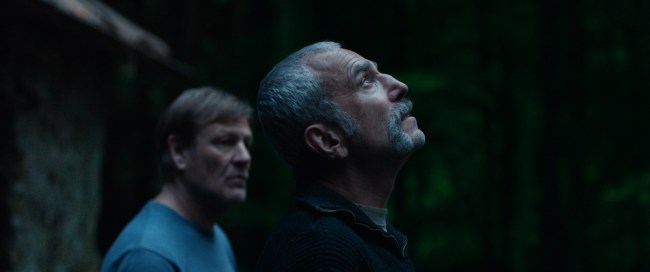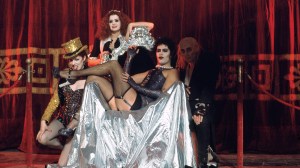You’ve heard of the fable of the boy who cried wolf? Well, Daniel Day-Lewis knows he’s now the actor who cried retirement. “I’ve gotten accused of retiring twice now,” the three-time Oscar-winner joked following the New York Film Festival press screening of Anemone, which features his first star turn since 2017’s Phantom Thread. “I probably made a f–king fool of myself by announcing that I was going to stop working — and I probably made a fool of myself by coming back.”
But Day-Lewis had a good reason for wanting to return to his chosen profession. Anemone marks the feature filmmaking debut of his son Ronan Day-Lewis, and the proud father wanted to share in that creative journey. The duo cowrote the drama together, which stars the elder Day-Lewis and Sean Bean as estranged brothers who reunite after a 20-year separation.
The actor said that his own eight-year separation from acting was initially supposed to be just one of the many extended breaks he’s taken from the big screen over the decades. “It would never have occurred to me to use the word ‘retirement,’” Day-Lewis explains. “I have stopped doing this work, because I wished to do some other work for a period of time.” (Day-Lewis famously stepped away from the big screen following 1997’s The Boxer, until Martin Scorsese persuaded him to appear alongside Leonardo DiCaprio in 2002’s Gangs of New York.)
“In the case of the latest [break], after the last film I made, I was in very low spirits,” Day-Lewis continued, referring to Paul Thomas Anderson’s Phantom Thread. That movie earned the actor his sixth Best Actor nomination; he had won his second statuette a decade prior for Anderson’s There Will Be Blood. Following the release of Phantom Thread, Day-Lewis issued a terse statement through his representatives that read: “Daniel Day-Lewis will no longer be working as an actor. He is immensely grateful to all of his collaborators and audiences over the many years. This is a private decision and neither he nor his representatives will many any further comment on the matter.”
Speaking with the NYFF audience, Day-Lewis made it clear that he knew he’d be inviting ridicule by agreeing to return to the screen for his son’s movie. But that was a risk he was ultimately willing to take. “To deny myself the possibility of working Ronan just to stand on pride would have been a worse decision that going, ‘I said that, so I’m sticking to it,’” he explained.
“The work was very precious to me, it was like food or drink,” he continued. “But I think what I have in common with a lot of actors is that I’m very ill-suited to the life around [acting] — the public aspect of it. It’s a paradox; people seem to be begging for attention doing that work, but it never occurs to you that you can’t switch that attention off if you’re lucky enough to get it.”
Day-Lewis also knows that he’s fortunate to have that kind of attention. “It’s nothing to moan about, because it means the work is being paid attention to,” he acknowledged. “But I was always ill at ease with the public aspect of the life, which very much involves the promotional part of it. I thought I’d get used to it, but I never really did. That sort of left me wondering if wasn’t just better off keeping out of it.”
Now that Anemone poised to bring him back into the public life — and potentially back to the Oscars — Day-Lewis says he’s steeled himself for the accompanying attention. “I was at a very low ebb before and I told myself, ‘I’m doing this [retiring] because I don’t really expect to find my way back to the appetite for this work again. And I did. I’m really grateful for it, and I hope to do it again.”
For his part, Ronan Day-Lewis says that he’s equally grateful to be making his first film with an actor — and a person — he’s known all his life. “I had two big advantages,” the filmmaker said. “First, we wrote the script together, adn we had spoken exhaustively about the character and the emotional trajectory of the story. So by the time we got on set, we had this shorthand and a lot of trust that was possible.”
“And then there was our familiarity with each other,” he added. “Any other young filmmaker would be so intimidated to work with him and have that dialogue and give notes. I was very lucky in both of those regards.”



